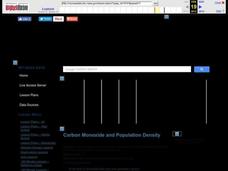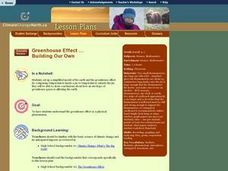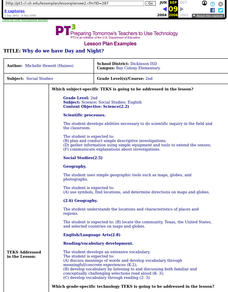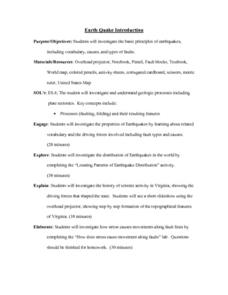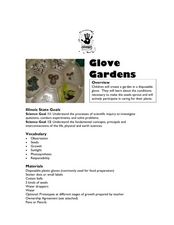Curated OER
The Amazing Ant
Students explain that ants are an important element of nature's balance. Ants eat many insects and are food to other animals. They watch a video and conduct hands-on activities that give them an excellent overview of the ants role in...
Curated OER
Weather Dance
Young scholars study weather and focus on specific dance concepts. They are introduced to different ty es of clouds and how they are formed. Next, they study wind and why it occurs.
Curated OER
Carbon Monoxide and Population Density
Tenth graders investigate the carbon monoxide level at a fixed latitude. They determine if there is a relationship to population density. They download data sets and generate a graph. They determine a link between human activity and...
Curated OER
Lesson 3: Acceleration and Force
A nine-page physics resource supports your instructional activity on acceleration. A step-by-step lesson plan walks you through the materials you need, the background information, steps for leading experimentation, and the explanation of...
Curated OER
The Green Truck Garden Giveaway
Students read "The Green Truck Garden Giveaway" and explore the hobby of gardening. After observing illustrations in the book, students predict possible events in the story. They discuss gardening and write a story about a community...
Curated OER
Barrels and Buckets: Access to Water - What Would It Be Like to Live in Africa?
Students compare water access in the United States with that of Africa. In this water access lesson, students located Ghana and Kenya on a globe before reading Peace Corps Volunteer accounts of the difficulty of accessing clean water....
Curated OER
Winter Wonderland - Winter Olympics and the Water Cycle
After a concise introduction to the water cycle, junior meteorologists access NOAA's average snowfall data. They choose a city to examine in terms of precipitation. Then they look at historical snowfall data and use it to predict snow...
California Academy of Science
Discovering Rainforest Locations
How many rainforests are there, where are they, and do global factors effect their locations? These are great questions that have great answers. Children in grades four through eight use several different maps to determine why...
Pennsylvania State University
Learn, Protect, and Promote Water
A hands-on activity helps learners explore the water cycle. After discussing how they use water, classes discuss water pollution and then move into a simulation where 20 pupils move through the water cycle based on description cards.
NASA
Christa's Lost Lesson: Effervescence
How are chemical reactions affected by gravity? Learners explore the phenomenon of effervescence as part of the Christa's Lost Lessons series. They compare findings in an experiment on effervescence to a video of a similar experiment in...
Curated OER
Volcanoes A-Z
Students examine terminology related to the study of volcanoes, geology, or the ecosystems that surround them. They make note of key words while reading exhibits, interpretive signs, or labels, or hearing them from each other, their...
Curated OER
Sundials and Shadows - What Can They Teach Us About Seasons?
Students collect and analyze data relating to seasonal changes. They view a video, research web sites and build a sundial to collect their data.
Curated OER
Greenhouse Effect ...Building Our Own
Students explore the greenhouse effect. They set up a simplified model of the earth and the greenhouse effect. Students compare temperatures inside a jar to temperatures outside the jar. Pupils collect information and create a line...
Curated OER
Bones
Fifth graders observe real bones and models to learn about the structure and function of the skeletal system. In this skeletal system lesson plan, 5th graders manipulate objects and models of bones. They handle real bones and determine...
Curated OER
Mass, Volume, and Weight
Students explore mass, volume, and weight. In this science and measurement lesson plan, students compare volume, mass, and weight after listening to the teacher's description of each. Students explore different scales and balances and...
Curated OER
Why Do We Have Day And Night?
Second graders demonstrate knowledge and appropriate use of hardware components, software programs, and their connections. After a lecture/demo, student groups utilize raisins and apples to demonstrate day and night. They put togethre a...
Curated OER
Description of Materials for Parts of a Fossil Lesson Plan
Young scholars study fossils. In this fossils lesson plan, students discuss and study real fossils. Young scholars color in pictures of fossils and their sections. Students then identify fossil picture parts and names. Young scholars...
Curated OER
Planets in Balance
Students study the solar system by researching the planets. In this exploratory lesson plan students divide into teams and create mobiles.
Curated OER
Making a Karst Dictionary
Students practice using the correct vocabulary in geology and hydrology. They use the Internet to research topics and practice their researching skills.
Curated OER
Earthquake Introduction
Learners investigate basic principles and properties of earthquakes, including vocabulary, causes, and types of faults. They examine history of seismic activity in their home state, and complete "Locating Patterns of Distribution" lab.
Curated OER
Weather
In this weather worksheet, students will match 4 weather terms to their correct definition. Vocabulary words include wind, weather, air mass, and front. Then students will complete 3 short answer questions based on high and low air...
Curated OER
Is the Hudson River Too Salty to Drink?
Students explore reasons for varied salinity in bodies of water. For this geographical inquiry lesson, students use a variety of visual and written information including maps, data tables, and graphs, to form a hypothesis as to why the...
Curated OER
Soil Composition
Learners examine soil. In this soil composition lesson students participate in soil sedimentation and filtration activities. The learners discuss what non-living and living things are in soil and why it is so important.
Curated OER
Glove Gardens
Students investigate how seeds sprout. In this scientific inquiry lesson, students make predictions on which seeds will grow the fastest and observe the seeds over a period of time. Observations are recorded into a journal.




